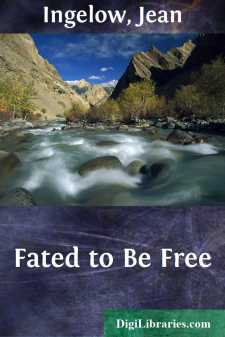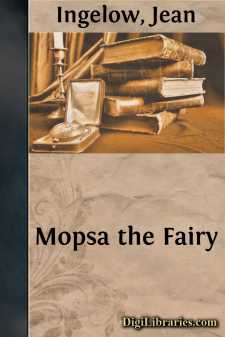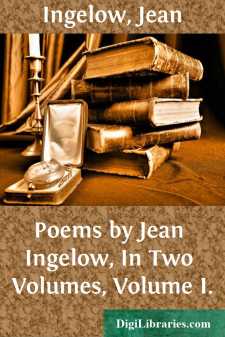Categories
- Antiques & Collectibles 13
- Architecture 36
- Art 48
- Bibles 22
- Biography & Autobiography 813
- Body, Mind & Spirit 142
- Business & Economics 28
- Children's Books 14
- Children's Fiction 11
- Computers 4
- Cooking 94
- Crafts & Hobbies 4
- Drama 346
- Education 46
- Family & Relationships 57
- Fiction 11829
- Games 19
- Gardening 17
- Health & Fitness 34
- History 1377
- House & Home 1
- Humor 147
- Juvenile Fiction 1873
- Juvenile Nonfiction 202
- Language Arts & Disciplines 88
- Law 16
- Literary Collections 686
- Literary Criticism 179
- Mathematics 13
- Medical 41
- Music 40
- Nature 179
- Non-Classifiable 1768
- Performing Arts 7
- Periodicals 1453
- Philosophy 64
- Photography 2
- Poetry 896
- Political Science 203
- Psychology 42
- Reference 154
- Religion 513
- Science 126
- Self-Help 84
- Social Science 81
- Sports & Recreation 34
- Study Aids 3
- Technology & Engineering 59
- Transportation 23
- Travel 463
- True Crime 29
Jean Ingelow
Jean Ingelow (1820–1897) was a British poet, novelist, and children's writer, known for her lyrical poetry and imaginative storytelling. Her most famous poetry collection, "Poems," published in 1863, was widely praised and went through numerous editions, solidifying her reputation in Victorian literature. Ingelow also wrote popular novels such as "Off the Skelligs" (1872) and "Fated to Be Free" (1875), blending romance, domestic themes, and social observation. Besides her literary work, she was known for her philanthropic efforts and remained a well-loved figure in both literary and religious circles.
Author's Books:
Sort by:
by:
Jean Ingelow
CHAPTER I. A WATCHER OF LILIES. "Unto whom all hearts be open, all desires known, and from whom no secrets are hid."—Collect, English Communion Service. In one of the south-western counties of England, some years ago, and in a deep, well-wooded valley where men made perry and cider, wandered little and read less, there was a hamlet with neither farm nor cottage in it, that had not stood two...
more...
by:
Jean Ingelow
ROSAMUND. His blew His winds, and they were scattered. 'One soweth and another reapeth.' Ay,Too true, too true. One soweth—unawareCometh a reaper stealthily while he dreams—Bindeth the golden sheaf, and in his bosomAs 't were between the dewfall and the dawnBears it away. Who other was to blame?Is it I? Is it...
more...
by:
Jean Ingelow
CHAPTER I. ABOVE THE CLOUDS. “And can this be my own world? ’Tis all gold and snow, Save where scarlet waves are hurled Down yon gulf below.” “’Tis thy world, ’tis my world, City, mead, and shore, For he that hath his own world Hath many worlds more.” A boy, whom I knew very well, was once going through a meadow, which was full of buttercups. The nurse and his baby sister were with him;...
more...
by:
Jean Ingelow
DIVIDED. I. An empty sky, a world of heather, Purple of foxglove, yellow of broom;We two among them wading together, Shaking out honey, treading perfume. Crowds of bees are giddy with clover, Crowds of grasshoppers skip at our feet,Crowds of larks at their matins hang over, Thanking the Lord for a life so sweet. Flusheth the rise with her purple favor, Gloweth the cleft with her golden...
more...





